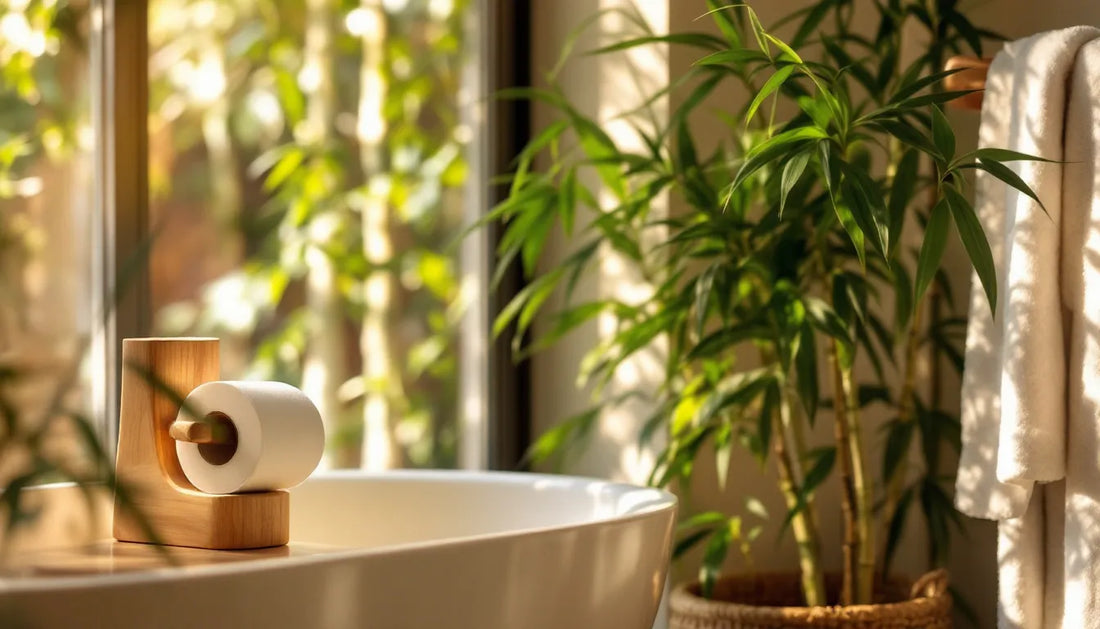When it comes to reducing our environmental footprint, every small decision counts – even the toilet paper we use. Bamboo toilet paper is gaining attention as a greener alternative to traditional wood-based toilet paper. At Doogood, we’re passionate about exploring eco-friendly products, and bamboo TP stands out with benefits that make it an appealing choice for eco-conscious consumers. Let’s dive into why bamboo toilet paper might be a smart swap for your bathroom.
Why Bamboo TP is a Sustainable Choice
Rapid Growth for Sustainability: Bamboo is one of the fastest-growing plants, capable of shooting up as much as 35 inches in a single day. Unlike traditional trees, which can take decades to mature, bamboo reaches full growth within 3-5 years. This rapid growth allows for quicker, more sustainable harvesting cycles, reducing pressure on forests and promoting a more sustainable paper source. Choosing bamboo TP can be a simple way to support faster-regenerating resources.
Water Efficiency: Water conservation is crucial, and bamboo uses 30% less water than traditional trees, making it a more sustainable option for paper production. In areas where water resources are limited, this difference can be significant. By requiring less water to grow, bamboo helps conserve precious freshwater supplies, which is essential for maintaining healthy ecosystems.
Chemical-Free and Healthier for You: Many bamboo toilet paper brands prioritize eco-friendliness by offering products free from harmful chemicals, dyes, and fragrances. These chemical-free options benefit not only the environment but also consumers, reducing exposure to potentially irritating substances. By choosing bamboo TP, you’re making a healthier choice for yourself and a cleaner choice for the planet.
Lower Carbon Footprint: Bamboo has a smaller carbon footprint than traditional virgin wood toilet paper, and while it may have a slightly higher footprint than recycled options, bamboo’s carbon absorption during growth helps offset emissions. The natural growth process of bamboo absorbs CO₂, balancing out some of the emissions involved in its production and transport. At Doogood, we encourage looking for products that emphasize sustainability from growth to processing.
Addressing Concerns with Sustainable Solutions
While bamboo toilet paper offers numerous advantages, it’s essential to make informed choices. Here’s how to address some concerns:
- Look for FSC Certification: Some companies clear forests to cultivate bamboo, impacting ecosystems. Choosing products with FSC certification ensures responsible sourcing and forest preservation.
- Support Brands with Biodiversity Goals: Large bamboo plantations can disrupt local ecosystems. Brands that prioritize sustainable farming and biodiversity help mitigate these effects.
- Choose Low-Impact Processing: The production of bamboo TP can involve energy and chemicals. Opt for brands that use renewable energy and minimal processing to ensure a lower environmental impact.
- Mind Transport Emissions: Most bamboo TP is sourced from China, increasing transport emissions. Brands that practice carbon offsetting or support carbon-neutral shipping make a positive difference.
Making a Positive Impact with Small Choices
Switching to bamboo toilet paper is a simple step, but there are other ways to reduce your environmental impact in the bathroom:
- Consider Recycled Toilet Paper: If available, recycled TP reduces the need for new tree harvesting and minimizes waste.
- Opt for FSC-Certified Bamboo: This certification promotes responsible sourcing.
- Reduce Usage: Reducing your TP use can lower your environmental footprint.
- Explore Alternatives: Consider bidets or other alternatives that reduce TP reliance altogether.
Conclusion: Small Steps, Big Impact
While bamboo toilet paper isn’t a perfect solution, it’s a step toward more sustainable bathroom habits. By choosing responsibly sourced bamboo, recycled options, or exploring bidets, you can support a healthier planet. At Doogood, we believe that even the smallest choices add up to meaningful environmental change. Switching to bamboo TP is one small, yet impactful way to do good for the Earth.
References
-
Forest Stewardship Council. (n.d.). About FSC. Retrieved from https://www.fsc.org/en/about
-
Natural Resources Defense Council. (2020). The hidden costs of toilet paper: What you need to know. Retrieved from https://www.nrdc.org/experts/katie-pelch/hidden-costs-toilet-paper
-
World Wildlife Fund. (2021). Deforestation and its impacts. Retrieved from https://www.worldwildlife.org/threats/deforestation-and-forest-degradation
-
EcoWatch. (2019). Why bamboo toilet paper is better than regular toilet paper. Retrieved from https://www.ecowatch.com/bamboo-toilet-paper-2645708810.html
-
Better Planet. (2022). The impact of toilet paper on the environment. Retrieved from https://betterplanet.com/impact-toilet-paper-environment
